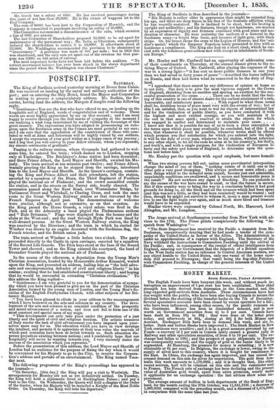Mr. Henley and Mr. Cardwell had an opportunity of addressing
some of their constituents on Thursday, at the annual dinner given to the re- tiring Mayor of Oxford. Mr. Cardwell, after placing the expenses of the war in a strong light—" it has cost us more public treasure in one year than we had saved in forty years of peace "—described the losses inflicted on Russia, and then laid down what he conceived to be the duty of Eng- land.
"I apprehend that there cannot be any difference of opinion at home as to our duty. Our duty is to give the most vigorous support to the Crown of England, shrinking from no sacrifice and sparing no exertion for the suc-
cessful prosecution of the cause There can be no doubt that the feel- ing of this country is one of sincere desire for the earliest attainment of a safe,
honourable, and satisfactory peace With regard to what these terms shall be, doubtless terms of peace must vary with the events of war ; but of this I am satisfied, that, as you went to war for objects of international law and for the vindication of public liberty, as you have conducted it with the highest and most exalted courage, so you will maintain it to the end in that same spirit; resolved to attain the objects for which you engaged in conflict and determined to maintain your cause I know not that it is possible for any of us to form a clear conception of the terms upon which peace may eventually be concluded, but of this I am sure, that whenever it shall be possible, whenever terms shall be offered which promise you that satisfaction for which you entered into the fight, it will be the duty of every man, whatever be his station, without reference to any other object, to let all the ends he aims at be his country's, his God's, and truth's, and with a single purpose, for the vindication of European li- berty and the safety and honour of England, to determine upon the ques- tions laid before him."
Mr. Henley put the question with equal emphasis, but more homeli- ness.
When two strong persons fall out, unless some providential interposition change the mind of one of them, " nothing comes of it until one or the other gets a very good thumping. This always produces some effect ; and then things which to the defeated seem unjust, becomejust and admissible, unpalatable conditions are swallowed, and a secure and honourable peace is the result." He saw nowhere any signs of flinching. No one pretends to say the causes of the war have ceased to exist, or that the future is secure. But if this country were to bring the war to a conclusion before it had good grounds for doing so, all the blood and all the treasure which had been spent (and this was not a little, as they had been reminded) would-be wasted ; and then, though he might not survive to witness it, many a man present would live to see the fight begin over again, and as much more blood and treasure would have to be expended. Similar views were expressed by Colonel North, Mr. Harcourt, Lord Abingdon, and Mr. Langston.


























 Previous page
Previous page